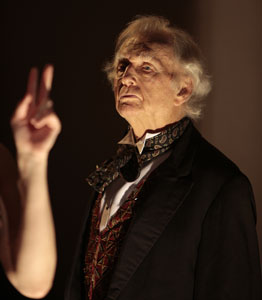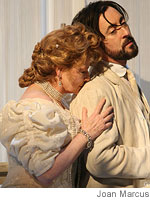TT: Introducing…The Amazing Prospero!
Today’s Wall Street Journal drama column consists of a rave and a pan, in that order. First I report on a production of The Tempest that I saw last Sunday in Cambridge, Massachusetts, followed by a review of the American premiere of Caryl Churchill’s Drunk Enough to Say I Love You? Here’s a sample.
* * *
All theater is magic. Even the most naturalistic of productions seek to deceive us into supposing that the stage we see is really someplace else: a cluttered living room, a sterile doctor’s office, a grimy inner-city diner. But few things can be so spellbinding as a play whose director shrugs off literalism and chooses instead to wave the wand of imagination. That’s what happens in the production of “The Tempest” currently being presented by Boston’s Actors’ Shakespeare Project, in which Patrick Swanson takes Shakespeare’s tale of a ship run ashore on an enchanted isle and turns it into a 19th-century magic show. I’ve reviewed many memorable Shakespeare productions in this space, but Mr. Swanson’s “Tempest,” like the “King Lear” that he mounted for Actors’ Shakespeare two seasons ago, ranks very near the top of my list….
 Prospero (Alvin Epstein) is decked out in a velvet-lined cape, Ariel (Marianna Bassham) dons the top hat and black tights of a conjuror’s assistant, and the play itself becomes a music-hall turn acted on a tiny thrust stage ringed with footlights that look as though they’d been made by Tom Edison himself. The “theater” is an 1889 Cambridge courtroom that has been converted into a performing space. All of Actors’ Shakespeare’s productions are site-specific, and David R. Gammons, the designer, makes the most of this one, using the second-story gallery as an alternate playing area whose staircase allows for grand entrances and exits. Eric McDonald performs his incidental music in full view of the audience, rattling a thunder sheet and tootling on a slide whistle with the flair of an old-time radio sound-effects man.
Prospero (Alvin Epstein) is decked out in a velvet-lined cape, Ariel (Marianna Bassham) dons the top hat and black tights of a conjuror’s assistant, and the play itself becomes a music-hall turn acted on a tiny thrust stage ringed with footlights that look as though they’d been made by Tom Edison himself. The “theater” is an 1889 Cambridge courtroom that has been converted into a performing space. All of Actors’ Shakespeare’s productions are site-specific, and David R. Gammons, the designer, makes the most of this one, using the second-story gallery as an alternate playing area whose staircase allows for grand entrances and exits. Eric McDonald performs his incidental music in full view of the audience, rattling a thunder sheet and tootling on a slide whistle with the flair of an old-time radio sound-effects man.
Mr. Epstein, who turns 83 in May, played Lear to awesomely eloquent effect for Actors’ Shakespeare in 2005. Now he speaks the lines of Prospero, Shakespeare’s other old-age star turn, with a fullness of understanding to which no actor can aspire until he reaches the time of life when (as Prospero puts it) “every third thought shall be my grave.”…
I’ve never seen a worse play by a better author than Caryl Churchill’s “Drunk Enough to Say I Love You?” That Ms. Churchill should make so embarrassing an impression in a mere 45 minutes is further proof that politics can make artists stupid, for this pathetic little playlet is nothing more than a political cartoon, one whose draftsmanship is as crude as its underlying premise.
The lights go up on Sam (Scott Cohen), a handsome homosexual who has seduced Guy (Samuel West), a married man with children, and persuaded him to abandon his family and job. Within a half-minute or so, we figure out that Guy is England, Sam is the U.S. (duh, get it?) and the abandoned wife and kids are the European community. The rest of “Drunk Enough to Say I Love You?” consists of a lovers’ quarrel conducted in unpunctuated sentence fragments: “so much fun in my life…being powerful and being on the side of good is…God must have so much fun…win win win.” Needless to say, the point of these coy exchanges is that the American government bears sole responsibility for all the evil in the modern world…
* * *
Read the whole thing here.
TT: Jon Hassler, R.I.P.
One of my favorite American novelists, Jon Hassler, died yesterday. I wrote about him last summer:
Hassler is more a middlebrow than a modernist, and his (mostly) sympathetic chronicles of Minnesota life are written in a straightforward, accessible style. Judge him by the exalted standards of Proust and Joyce–or, for that matter, O’Connor–and he’ll come up short. Try thinking of him as a Midwestern John P. Marquand and you’ll get a better idea of what he’s about. “Of all the people I know,” Marquand observed, “only Americans, because of some sort of inferiority complex, keep attempting the impossible and trying to get away from their environment.” Jon Hassler has never made that mistake. His novels are set in the small-town world where he was born and in which he has spent the whole of his 74 years, and his characters are ordinary people who spend their days grappling, sometimes successfully and sometimes not, with the ordinary problems of life, love, aging, and death.
One of the things that makes these characters so distinctive is that many (though not all) of them are churchgoers. Not coincidentally, Hassler is a Catholic novelist, and certain of his books are very decidedly the work of a Catholic Novelist. Yet their temperate emotional climate has little in common with the claustrophobic creations of, say, Graham Greene or François Mauriac. In Hassler’s novels, no one, not even the priests, is obsessed with the problem of faith in the modern world, nor do his teachers, grocery-store owners, and family doctors take much of an interest in what Browning called “the dangerous edge of things.” They are simply trying to get along in a complicated world, and though they view that world through the prism of belief, most have learned that few answers are quite so easy as they look…
North of Hope, Hassler’s best novel, was reissued two years ago by Loyola Classics. I commend it to your attention.
TT: Almanac
“Without the meditative background that is criticism, works become isolated gestures, ahistorical accidents, soon forgotten.”
Milan Kundera, “On Criticism, Aesthetics, and Europe”
TT: So you want to see a show?
Here’s my list of recommended Broadway, off-Broadway, and out-of-town shows, updated weekly. In all cases, I gave these shows favorable reviews in The Wall Street Journal when they opened. For more information, click on the title.
Warning: Broadway shows marked with an asterisk were sold out, or nearly so, last week.
BROADWAY:
• August: Osage County (drama, R, adult subject matter, closes Apr. 20 and reopens Apr. 29 at the Music Box Theatre for an open-ended run, reviewed here)
• Avenue Q (musical, R, adult subject matter and one show-stopping scene of puppet-on-puppet sex, reviewed here)
• A Chorus Line (musical, PG-13/R, adult subject matter, reviewed here)
• Grease * (musical, PG-13, some sexual content, reviewed here)
• The Homecoming (drama, R, adult subject matter, closes Apr. 13, reviewed here)
• In the Heights (musical, PG-13, some sexual content, reviewed here)
• The Little Mermaid (musical, G, entirely suitable for children, reviewed here)
• November (comedy, PG-13, profusely spattered with obscene language, reviewed here)
• Passing Strange (musical, PG-13, adult subject matter, reviewed here)
• Sunday in the Park with George * (musical, PG-13, too complicated for children, closes June 16, reviewed here)
OFF BROADWAY:
• Adding Machine (musical, PG-13, adult subject matter, too musically demanding for youngsters, reviewed here)
 • The Seagull (drama, PG-13, adult subject matter, closes Apr. 13, reviewed here)
• The Seagull (drama, PG-13, adult subject matter, closes Apr. 13, reviewed here)
ON TOUR:
• Moby-Dick–Rehearsed (drama, G, not suitable for children, touring the U.S. through May 17, reviewed here)
CLOSING NEXT WEEK ON BROADWAY:
• Alfred Hitchcock’s The 39 Steps * (comedy, G, suitable for bright children, closes Mar. 29 and reopens at the Cort Theatre on Apr. 29, reviewed here)
• The Seafarer (drama, PG-13, adult subject matter, closes Mar. 30, reviewed here)
CLOSING SUNDAY IN LOS ANGELES:
• Victory (drama, PG-13, adult subject matter, reviewed here)
TT: Almanac
“Beauty is like piety–you cannot run and read it; tranquility and constancy, with, now-a-days, an easy chair, are needed.”
Herman Melville, “The Piazza”
TT: Almanac
“A work is never completed except by some accident such as weariness, satisfaction, the need to deliver, or death: for, in relation to who or what is making it, it can only be one stage in a series of inner transformations.”
Paul Valéry, “Recollection”
OGIC: Band of brothers
I was completely won over by Eran Kolirin’s The Band’s Visit. Unassuming but quietly wise, this little movie from Israel and France appears to have come and gone from New York already, but it opened in Chicago last weekend and one can hope it is playing in other cities now as well. If you get a chance to see it, don’t miss out.
 Eight Egyptian policemen, who comprise the Alexandria Police Ceremonial Orchestra, travel to Israel to perform at the opening of an Israeli-Arab cultural center. The opening scenes find them negotiating with difficulty but with dignity the challenges of a foreign airport, identically dressed in stately powder-blue uniforms. In the movie’s signature image, they stand in a row in an empty landscape, waiting. Each carries a standard black suitcase and his instrument, from a large, curvy double bass case to a small, boxy clarinet case with many sizes and shapes in between. The dry comedy of this image–a little reminiscent, to me, of a William Booth cartoon–characterizes a good deal of the movie, in which the band gets lost on the way to their concert in a sort of fortuitous, or at least adventurous, detour.
Eight Egyptian policemen, who comprise the Alexandria Police Ceremonial Orchestra, travel to Israel to perform at the opening of an Israeli-Arab cultural center. The opening scenes find them negotiating with difficulty but with dignity the challenges of a foreign airport, identically dressed in stately powder-blue uniforms. In the movie’s signature image, they stand in a row in an empty landscape, waiting. Each carries a standard black suitcase and his instrument, from a large, curvy double bass case to a small, boxy clarinet case with many sizes and shapes in between. The dry comedy of this image–a little reminiscent, to me, of a William Booth cartoon–characterizes a good deal of the movie, in which the band gets lost on the way to their concert in a sort of fortuitous, or at least adventurous, detour.
The movie has its somber side, too, leavened but not dissolved by the gentle humor it finds in simply observing, with a certain patience, human behavior. There’s much to be said about the delicacy with which it probes relationships, especially the particular intimacy that can take hold between two people who were strangers yesterday. But that’s better experienced by you than broken down by me, and there’s something else that I want to point to here: the film’s capacious view of what it is to be an artist.
The men in the Alexandria Police Ceremonial Orchestra–which their leader, Tawfiq, refers to by its full name almost without exception–are a staid and well-ordered bunch. They are, after all, policemen. You might not see them, at first blush, as true artists. They’re a far cry from being free spirits. But as the unfolding plot reveals–and the joyous last scene, in which they play gloriously for a crowd of delighted faces, confirms–they’re most serious and passionate musicians underneath the regalia. Even that’s not quite right, though: the very point is that they’re serious and passionate musicians in their regalia. Their vocation and avocation aren’t separate. Early in the movie, the incongruity of “Alexandria Police Ceremonial Orchestra” plays for gentle laughs. By the end, “Police” and “orchestra” coexist frictionlessly–they make perfect sense together.
Also surprising is the movie’s treatment of what you might expect to be its central subject: friction between the Israeli characters and their Egyptian visitors. But political friction is not what this movie is interested in. To be sure, Kolirin acknowledges this tension in subtle, fleeting ways. But, though you’re highly attuned to its possibility as the movie begins, by the end it’s displaced by the spectrum of other, more interesting ways hosts and visitors have found to relate and react to one another.
